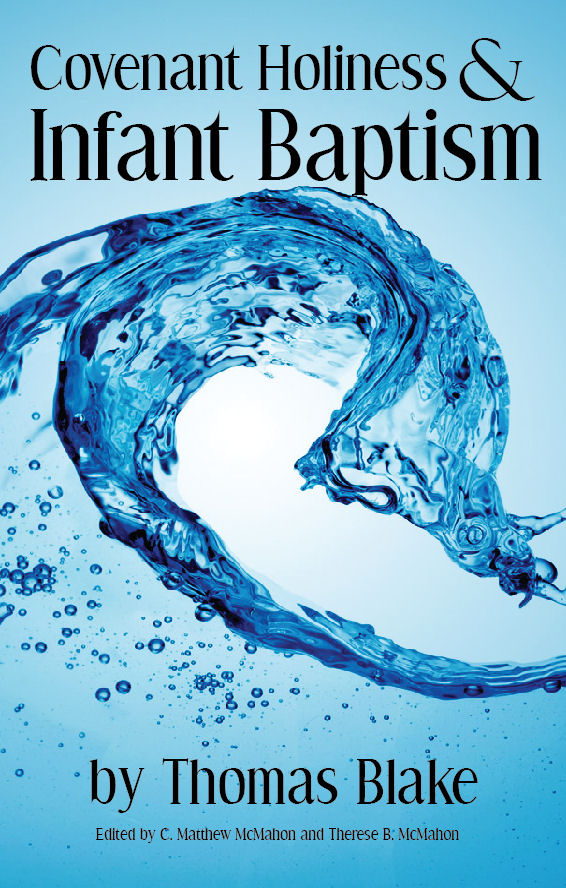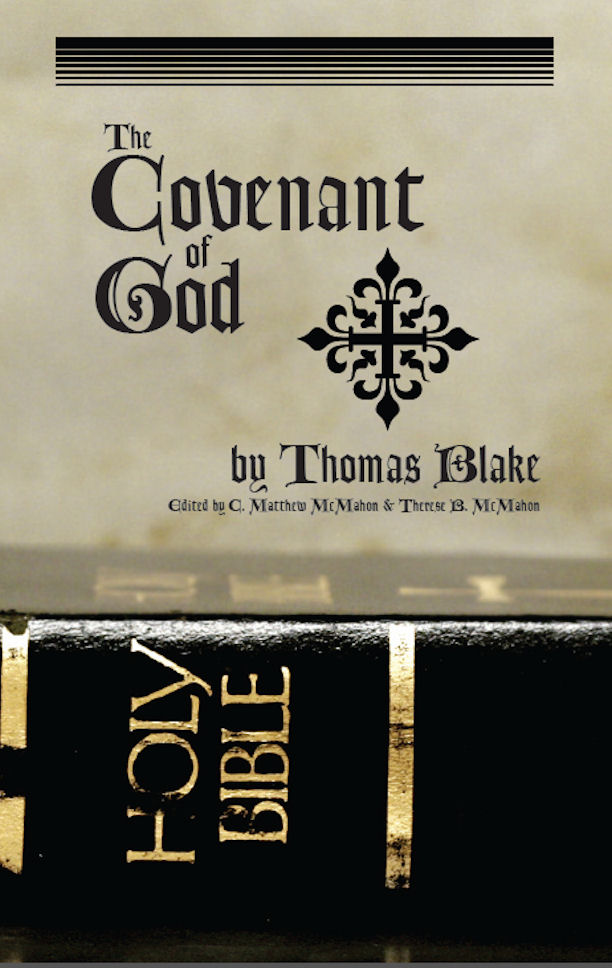Thomas Blake (1597-1657)
A Covenantal, Calvinistic, English Puritan and prolific writer on Infant Baptism and Election.“Take off the promise of God to your houses for times to come, and the foundation of your prayers for posterity is shaken.”
His Works:
Covenant Holiness and Infant Baptism by Thomas Blake – eBook
Buy the Print Book HERE
The Covenant of God by Thomas Blake – eBook
Buy the Print Book HERE
The Works of Thomas Blake (1597-1657) available: Puritan Publications is working to Publish Blake’s important works. We’ve already published some above that are linked to the books.
1. “Birth Privilege, or the Right of Infants to Baptism,” 1644.
2. “Infant’s Baptism freed from Antichristianisme.” In a full Repulse given to Mr. Ch. Blackwood in his Assault of that Part of Christ’s Possession which he holds in his Heritage of Infants, entitled “The Storming of Antichrist,”‘ 1645.
3. “A Moderate Answer to the Two Questions: (1) Whether there be sufficient Ground from Scripture to warrant the Conscience of a Christian to present his Infants to the Sacrament of Baptism; (2) Whether it be not sinful for a Christian to receive the Sacrament in a Mixt Assembly,” 1645.
4. “An Answer to Mr. Tombes his Letter in Vindication of the Birth-priviledge of Believers and their issue,” 1646.
5. “Testimony of the Ministers of Stafford to Solemn League,” 1648.
6. “Vindiciæ Fœderis, a Treatise of the Covenant of God with Mankind,” 1653.
7. “Infant Baptism maintain’d in its Latitude,” 1653.
8. “The Covenant Sealed, or a Treatise of the Sacrament of both Covenants,” 1655.
9. “Postscript to the Rev. and Learned Mr. Richard Baxter,” 1655–trenchantly answered by Baxter.
10. “Mr. Jo. Humphrey’s Second Vindication of a Disciplinary Anti-erastian, Orthodox, Free Admission to the Lord’s Supper, taken into consideration,” 1656
11. Occasional Sermons, “Ebenezer, or Profitable Truths after Pestilential Times,” 1666.
Biography of Thomas Blake (1597-1657):
Thomas Blake (1597-1657), puritan, was a native of Staffordshire. As he entered Christ Church College, Oxford, in 1616 in his nineteenth year, he must have been born about 1597. He proceeded to earn a B.A. and an M. A., and having obtained orders, Mr. Wood tells us, he had “some petite employment in the church bestowed on him.” “At length,” continues the historian, “when the Presbyterians began to be dominant, he adhered to that party,” and “subscribed to the lawfulness of the covenant (The Solemn League and Covenant) in 1648 among the ministers of Shropshire, and soon after, showing himself a zealous brother while he was pastor of St. Alkmond’s in Shrewsbury, he received a call to Tamworth in Staffordshire and Warwickshire, where also being a constant preacher up of the cause, he was thought fit by Oliver and his council to be nominated one of the assistants to the commissioners of Staffordshire for the ejecting of such whom they called ignorant and scandalous ministers and schoolmasters.”
Blake published a large number of books on puritan theology, but his attacks on Richard Baxter damaged his reputation with many nonconformists. His arguments indicate a narrow, if subtle, intellect. The following are his chief works: 1. ‘Birth Privilege, or the Right of Infants to Baptism,’ 1644. 2. ‘Infant’s Baptism freed from Antichristianisme. In a full Repulse given to Mr. Ch. Blackwood in his Assault of that Part of Christ’s Possession which he holds in his Heritage of Infants, entitled “The Storming of Antichrist,”‘ 1645—Wood misnames Blackwood ‘Charles’ for ‘Christopher.’ 3. ‘A Moderate Answer to the Two Questions: (1) Whether there be sufficient Ground from Scripture to warrant the Conscience of a Christian to present his Infants to the Sacrament of Baptism; (2) Whether it be not sinful for a Christian to receive the Sacrament in a Mixt Assembly,’ 1645. 4. ‘An Answer to Mr. Tombes his Letter in Vindication of the Birth-priviledge of Believers and their issue,’ 1646. 5. ‘Testimony of the Ministers of Stafford to Solemn League,’ 1648. 6. ‘Vindiciæ Fœderis, a Treatise of the Covenant of God with Mankind,’ 1653. 7. ‘Infant Baptism maintain’d in its Latitude,’ 1653. 8. ‘The Covenant Sealed, or a Treatise of the Sacrament of both Covenants,’ 1655. 9. ‘Postscript to the Rev. and Learned Mr. Richard Baxter,’ 1655–trenchantly answered by Baxter. 10. ‘Mr. Jo. Humphrey’s Second Vindication of a Disciplinary Anti-erastian, Orthodox, Free Admission to the Lord’s Supper, taken into consideration,’ 1656; and other pamphlets and occasional sermons. ‘Ebenezer, or Profitable Truths after Pestilential Times,’ 1666, which is assigned to him by Wood and by Brook, was not his, but by another Thomas Blake, who was ejected from East Hoadley, Sussex (Palmer, iii. 320).
Blake died at Tamworth, and was interred in his own church on 11 June 1657. His funeral sermon was preached by Anthony Burgesse, and was published in 1658, along with an oration by Samuel Shaw, then schoolmaster at Tamworth. It is entitled ‘Paul’s Last Farewell, or a Sermon preached at the Funerall of that godly and learned Minister of Jesus Christ, Mr. Thomas Blake, by Anthony Burgesse: appended, A Funerall Oration at the death of the most desired Mr. Blake, by Mr. Samuel Shaw, then Schoolmaster at the Free School at Tamworth,’ 1658. In the ‘Oration’ Blake is thus described: ‘His kindness towards you could not be considered without love, his awfull gravity and secretly commanding presence without reverence, nor his conversation without imitation. To see him live was a provocation to a godly life; to see him dying might have made any one weary of living. When God restrained him from this place (which was always happy in his company but now), he made his chamber a church and his bed a pulpit, in which (in my hearing) he offered many a heavenly prayer for you.’
[Wood’s Athenae, ed. Bliss, iii. 431-3; Brook’s Puritans, iii. 269-71; local researches; Blake’s Works.]





